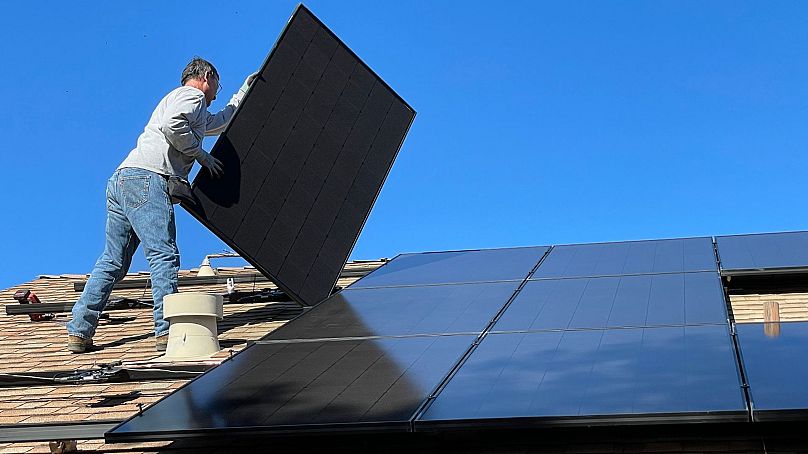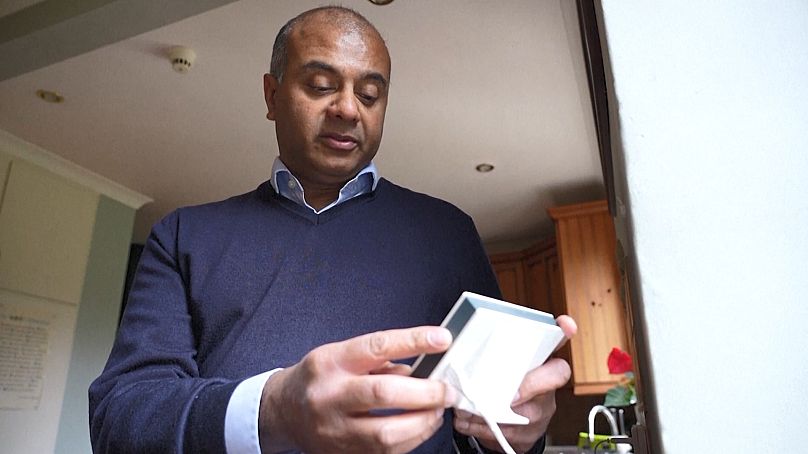Homeowners are going green at a faster pace, attempting to beat the energy crisis which saw electricity prices rise by 67 per cent over the last year.
In a town north of London, the weather's been cloudy over the winter months.
 ADVERTISEMENT
ADVERTISEMENT
 ADVERTISEMENT
ADVERTISEMENT
But it didn't stop this homeowner from installing solar panels in December.
On his smart metre, Kumi Thiruchelvam looks satisfied at the "0 watts" showing up under electricity. It's about 10 am, and he's not using any electricity from the grid.
Cost of installation? Between £12,000 and £13,000 (€13,500-€14,500), a fair chunk of savings, even for Thiruchelvam, who lives on a private avenue in Luton.
The investment was common sense for him following the surge in energy prices caused by the Russian invasion of Ukraine.
According to the Office of National Statistics, electricity prices in the UK had increased by 67 per cent in January 2023 compared to January 2022.
Solar power installations doubled in 2022 compared to 2021, according to MCS, the standards organisation in charge of solar installations.
"We've had a combination of soaring energy prices around the world, and then also we've increased our electricity consumption in the home through a number of reasons, including electric vehicles," says Thiruchelvam.
His family owns a big house and no less than three electric vehicles, so their electricity consumption is higher than the normal household, about 12,000 kWh per year.
Around two-thirds should now be provided by solar panels.
"We originally sought the configuration to be rear, which is where the sun comes up, but we went for the front because it spends more time in the front throughout most of the year than in the rear. Also, there's more shade in the rear with trees," he says.
Monitoring energy use using a mobile app
To get a quote for the installation, Thiruchelvam used Otovo, a Norwegian company which recently launched in the UK.
Using their app, he can monitor the electricity generated by his photovoltaic (PV) installation from his phone. The data comes from the inverters installed in the attic.
Their role is to change the direct current generated by the solar panels into alternating current to power appliances in the house safely.
They also communicate with the grid and monitor the electricity generated.
"We went for two hybrid inverters allowing for me to use a battery in the future," says Thiruchelvam.
"But because battery technology is still evolving, I chose not to. And also I viewed at that time that we would be consuming everything we'd be generating. So we didn't. But most likely I will upgrade the system as we approach summer with batteries."
Batteries can store electricity which can be used later on - at night, for example - further reducing the reliance on the grid.
Their downside is cost, about £5,000 (€5,700) on average.
Thiruchelvam ordered his PV installation from Otovo's website, which can give a quote instantly based on the address.
"You go to otovo.co.uk, you enter in your postcode, and then you're able to generate basic pricing based on whether you want a battery, how many panels you want. And then based on that, you input your personal details, and you can be put in touch with one of our sales consultants," says Jina Kwon, general manager, Otovo UK.
The website can predict how much money solar panel owners will save based on sunlight data.
"Despite the weather that we have today and the general conception of cloudy days in the UK, actually it's one of the very well-producing countries, in Europe," says Kw.on
So we produce the same amount of solar electricity as comparable to, say, Germany and in many parts of France and Spain. So there's quite enough sunlight in the UK for consumers."
The energy crisis encourages more solar in the UK
In January alone, nearly 15,000 domestic solar power installations were added to the British grid, more than any other month since 2016.
Tom Faulkner, head of assets, infrastructure and networks at Cornwall Insight, says the solar energy market has radically changed over the last few years, and rising electricity costs are fuelling the drive for PV installations.
"Historically, you would have seen export rates providing your benefit. So you would have seen that you would be able to export electricity to the grid," says Faulkner.
"Now, a lot of that saving comes from avoided costs, because the cost of energy or electricity is so high from a domestic point of view, and whilst there are schemes in place to protect them from the actual costs, £2,500 (€2,800) a year for an average household is still very high on historical averages."
"And as a result, you're now seeing savings because you're able to avoid those costs. So that shortens the payback period."
In Thiruchelvam's house, the boiler uses gas.
Thanks to an immersion diverter, the surplus of electricity produced by the solar panels is used to heat up the water - another way to soften the blow of the energy crisis.
But selling the - limited - extra surplus energy is low on his priority list.
Ofgem, Great Britain's energy regulator, dropped the minimum export price to £0 in 2019, allowing energy companies to buy electricity at very low prices from solar panel owners.
Prices compiled by Solar Energy UK in January show the highest price for electricity export is £0.15 (€0.17) per kWh, while buying electricity costs three times as much, with electricity rates currently capped at £0.34 (€0.38) per kWh.












